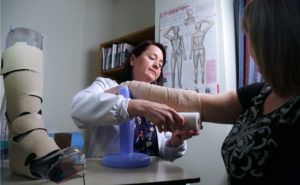Nursing
Registered nurses (RNs) specializing in oncology are involved in all areas of your care and will be your main contact throughout your treatment and management of your illness. Nursing services are provided by oncology nurses, nurse practitioners (NPs), cancer patient navigators, personal care attendants (PCAs) and screening program nurses, as well as specialized nurses in the areas of lympedema or enterostomal therapy.
Lymphedema Program

Lymphedema is swelling that is caused by a buildup of lymph fluid in the tissues. This swelling can be the result of a tumor, surgery and/or radiation.
Current and past cancer patients who have lymphedema, or at risk, can be referred to the Lymphedema Program.
The Lymphedema Program is staffed by an oncology nurse with advanced certification in lymphedema management. The nurse will provide recommendations on how to prevent and/or manage your lymphedema. Your initial visit may be at cancer center or by video conferencing through telehealth.
Education, early detection and intervention provides the best possible outcome for lymphedema. Your oncologist, or any member of the health-care team, can refer you.
How to contact the lymphedema nurse:
Any member of the health-care team can refer current patients of the Cancer Centres. If discharged from the cancer centre, then a doctor’s referral is required. For more information, please call 709-777-8713.
Resources
- National Lymphedema Network has resources for both patients and health care providers, including position papers on risk reduction, exercise and treatment.
- Canadian Lymphedema Framework– current Canadian lymphedema management guidelines.
- Lymphedema Association of Newfoundland and Labrador provides information, networking and support.
Enterostomal Therapy Program
Enterostomal therapy nurses are registered nurses with specialized training in treating and assisting patients with ostomies, such as colostomy, ileostomy, urostomy, and wounds. An ostomy is a surgically created opening in the body that allows for the passage of stool, urine or mucous from the inside of the body to the outside. Enterostomal therapy nurses may also be referred to as an ET Nurse, ostomy or stoma nurse and can provide advice, guidance and support for patients, families and caregivers as they care for and live with their ostomy.
These nurses can provide you with information on ostomy appliances and ostomy care. An ET nurse can suggest treatment for ill-fitting ostomy appliances, problems such as fistulas, irritated skin and food blockages. Enterostomal therapy nurses have many educational materials that they can share with you to help you take care of your ostomy and continue with regular daily activities.
It is important for patients and their families and caregivers to learn how to care for their, or their loved one’s, ostomy.
How to contact the Enterostomal Therapy nurses:
Any member of the health-care team can refer patients. Patients can also call to make their own appointment at 709-777-7554 or 709-777-7555.
Resources:
- Ostomy Society of Canada provides information, networking and support.
- The Canadian Association for Enterostomal Therapy provides information and will help locate a local ostomy nurse.
- Local Support Groups – Facebook: Ostomy NL Facebook Group (St. John’s chapter) and Ostomy Exploits Facebook Group (Grand Falls-Windsor satellite chapter).
